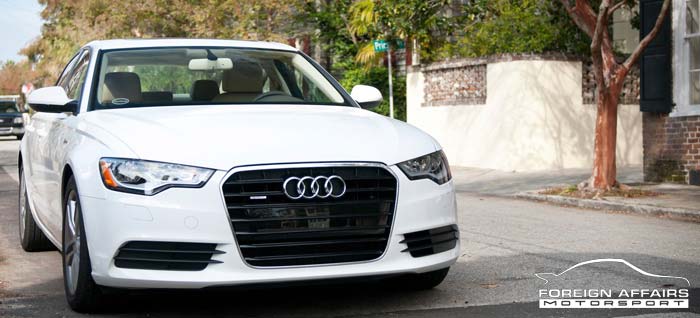Gasoline vs. Diesel | A Debate Revisited

Our certified Audi service center has seen all kinds of German sedans drive through its doors, and we have been able to closely assess the progression of engine technology. Although hybrids and EVs (Electric Vehicles) continue to advance, the internal combustion engine still dominates, and over the last couple of years, the tug-of-war between gasoline and diesel has continued unabated.
While diesel once clearly dominated in terms of economy, and gas in terms of refinement, the advantages of each have been diluted by the progression of the other. Gasoline-powered engines have become highly efficient thanks to downsizing and turbocharging, while diesels have become quieter and smoother. While diesels have found favor in Europe, there are far fewer options in the U.S, and in the year through April 2017, only 28,604 diesels were sold in the U.S, 35% down from the previous period. It coincides with Mercedes-Benz’s decision, earlier this year, to stop selling diesels in the country, the maker stating that fewer than one out of every 100 vehicles they sold in the U.S. were diesels. The Volkswagen AG emissions scandal didn’t help much either, with 12 diesel models being pulled from the VW / Audi / Porsche stable as a result.
All this being said, should you even consider buying one of the few diesels still sold in the local market? If you’re uncertain, consider this:
- Diesels still are still more fuel-efficient by up to 30% over their petrol counterparts, and if you spend lots of time on the long road, this factor still counts.
- With better torque, diesel still offers a unique drivability factor which you may prefer. A powerful diesel pairs particularly well with a modern automatic transmission for a generally effortless experience from behind the wheel.
- The extra purchase price and servicing costs of a diesel may outweigh its economy advantage.
One of the few remaining diesels in the country is the BMW 328d sports sedan. It offers a claimed range of 675 miles vs. the gasoline version’s 525, but is down on power (180 hp vs. 240 hp). Both the 328d and 320i offer engaging driving experiences, but the diesel remains a noisier and less refined option when accelerating, even if it quietens down nicely on the open road. However, even the base 320i no longer suffers from a lack of low-down torque as did older generations of the model, thanks to turbocharging. If the difference in costs are negligible, we suggest taking each for a test drive to figure out which one offers the best driving experience for you.
However, the long-term picture for diesels isn’t quite as rosy as it once was. For the 2017 model year, just nine diesel models are available from five brands, down from 22 models and eight brands as recently as 2015. Globally, diesel market share is expected to fall to 4% in 2025, down from just over 13% now.
With gasoline engines continuing to evolve, we feel that the advantages of the modern turbodiesel are slowly being eroded. Unless you prefer the driving characteristics associated with turbodiesels – or you want maximum economy – you can’t do much better than a gas-powered turbo for a strong combination of power, economy, driving enjoyment, and refinement.



